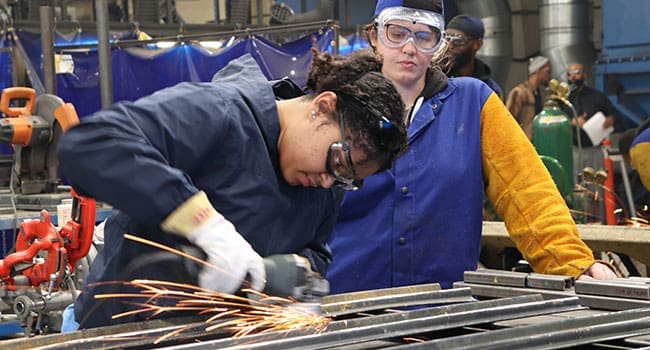 Why on Earth has Canada not been able to change the number of women entering and progressing in skilled trades careers or associated apprenticeship programs?
Why on Earth has Canada not been able to change the number of women entering and progressing in skilled trades careers or associated apprenticeship programs?
We’ve been talking about this subject for too long. For many women who trailblazed and pushed their way into skilled trades jobs over the last decades, it must feel exhausting.
In 2020, it’s still an issue.
Consider a 2019 report from Dr. Marcia Braundy, Lessons Learned and Best Practices Increasing the Successful Participation of Women in Apprenticeship & the Skilled Trades. It states that “over 300 reports and analyses (some over 100 pages long), have been published in Canada examining the barriers and challenges to increasing the successful participation of women in apprenticeship, as well as the attractions and necessities for doing so.”
A recent review by the Canadian Apprenticeship Forum (CAF-FCA), based on the latest apprenticeship data available from Statistics Canada, shows that in 2018 women made up 4.5 per cent of total female apprenticeship registrations in construction, manufacturing and transportation trades, a 0.6 per cent increase from 2014.
In addition, the barriers women face in entering and staying in these careers have been shared widely at events, on numerous websites, in government Hansard transcripts and covered by national and regional media.
Why is change so slow?
CAF-FCA recently launched a National Strategy for Supporting Women in the Trades. Over 300 women apprentices and journeypersons identified action items for change at two CAF-FCA Supporting Women in Trades Conferences (SWiT) held in 2018 and 2019.
On the cutting edge of Canada’s economic future by Nobina Robinsons and Sarah Watts-Rynard
A national task force comprised of members from across the apprenticeship and skilled trades community identified strategic priorities based on the feedback from the events and developed the strategy.
Why is this important?
Because the national strategy is industry-led.
What makes it so different from anything else out there?
It sets a national target for women’s representation and holds industry accountable for their training numbers. If in Canada the goal is to recruit more women to the skilled trades and retain them, then we must agree that numbers matter.
We must also face the reality that, so far, leaving employers, organizations and governments to their own devices has created opportunity for some to provide excuses rather than a commitment to making change.
There are no women applying for these jobs is one explanation that’s often raised as a reason why numerical targets can’t work. Chicken or egg?
Perhaps if industry focused on developing bias-free human resources policies, providing respectful workplace training to employees and management, and implementing a zero-tolerance approach to workplace harassment and discrimination, more women would be inclined to apply. Additionally, parents may even encourage their children to explore these careers.
The CAF-FCA national strategy doesn’t provide a recruitment strategy for the promotion of the skilled trades as viable careers or apprenticeship as an equitable educational pathway.
It focuses on preparing the house for the dinner party, not on inviting the guests – at least not yet. It provides industry and other stakeholders with the tools to address well-known barriers for women in the skilled trades by sharing best practices and resources in one place, at SWiTCanada.ca.
The strategy also celebrates tangible commitments made by employers who take the CHAMPIONS4CHANGE pledge to hire and train more women in their organizations. Together, those champions will change the collective number and lead by example.
The hope is that this movement, supported by this national strategy, will lead to inclusive and respectful workplaces, period.
Using the SWiT platform to highlight tools that address systemic barriers to inclusion, doors should open for others who want rewarding careers in the skilled trades but don’t currently see it as a safe place.
France Daviault is the executive director of the Canadian Apprenticeship Forum, a passionate communicator and advocate for equity workplaces and communities.
France is a Troy Media Thought Leader. Why aren’t you?
The views, opinions and positions expressed by columnists and contributors are the author’s alone. They do not inherently or expressly reflect the views, opinions and/or positions of our publication.

